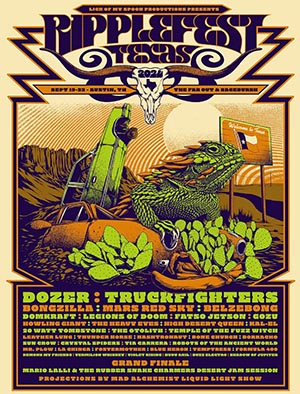Spawned from a film score office across the street from L.A. punk club The Masque, Wall Of Voodoo get their 15 minutes of MTV fame only to duck back into the shadowy alleys.

This one-hit wonder nonsense and Devo comparisons must really irk Wall Of Voodoo. I don’t even recall ever even seeing “Mexican Radio” on MTV — they must have played it at 2 in the morning. I did, however, fairly regularly hear a wide range of Wall Of Voodoo’s tracks from their 1980 self-titled EP, Dark Continent (1981) and Call of the West via a college radio station. Acme Soundtracks proprietor and vocalist Stan Ridgway, with a twang that sounds like Jimmy Stewart in a crime noir film that derails into a Thomas Pynchon story was a classic unreliable narrator, spinning a yarn only to leave you roofied and robbed in the gutter. Perhaps it’s a stretch to call this superior to the sophisticated adult pop of Peter Gabriel, Kate Bush and Elvis Costello, but this is the musical world I would have gladly lived in full time. While some might be reminded of the quirky early work of Oingo Boingo, to me Wall Of Voodoo put together seemingly disparate elements of new wave, synthpop, the minimal wave of Tuxedomoon, Ennio Morricone’s spaghetti westerns, and the garage noir atmospherics of The Cramps and Gun Club into a singular vision of eerie, atmospheric storytelling and character studies that each play out like films. It’s a pity they didn’t have the budget to make videos for every track.
The Farfisa organ and robotic drum machines create a spooky ambience that might lead you to expect zombies and aliens to make appearances in the lyrics. Instead it’s more angst-ridden realism, where the only deaths in the titular West are hopes (“They Don’t Want Me”), dreams (“Factory”) and even ambition (“Tomorrow,” “Lost Weekend”). Ridgway’s famously deadpan delivery works especially well in conveying alienation on “Look At Their Way.” “Mexican Radio” must have been a surprise hit, but that’s the power of a simple, yet catchy chorus. The song was inspired by the unregulated high-wattage AM stations in Mexico like XERF, XEG, and XERB. I myself tuned in those stations while fiddling with my handheld AM radio at night, or in my pup tent on sandbars of the Mississippi.
While Wall Of Voodoo made judicious use of synths, they also had a great guitarist in Marc Moreland, who’s riffs drive “Spy World” along with Joe Nanini’s bongo percussion. His jangly picking is also showcased on the instrumental “On Interstate 15,” along with Ridgway’s piano. “Hands of Love” keeps the album from being near perfect, but it closes strong with the epic title track that wraps up all the themes with capable storytelling.
Call of the West is the perfect example of hooks and pop songcraft not being the only point of music. The creation of cohesive vision and mood of an imaginary sonic world, even one that is bleak and sinister, is an artistic achievement that can outlast many other more commercially successful ventures. Ridgeway and Nandini left the band in 1983. While the band carried on with a new singer, Ridgway’s solo album The Big Heat (1986) is the true follow-up to Call of the West
#56 Slicing Up Eyeballs
#48 Acclaimed Music

March 29, 2024
Fester’s Lucky 13: 1994
January 4, 2024
Fester’s Lucky 13: 1989
December 1, 2023
Fester’s Lucky 13: 2023 Year-End Summary



